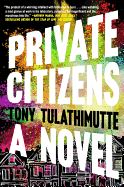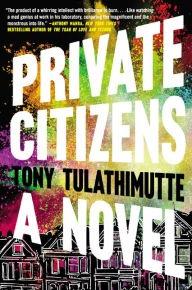
 With Stanford degrees, plenty of drugs and alcohol, and a fragile sense of purpose, the four friends in Tony Tulathimutte's first novel, Private Citizens, struggle to succeed in early 21st-century San Francisco. A Stanford graduate himself, Tulathimutte is wise to the jargon, angst and self-centered preoccupations of these smart Silicon Valley millennials buzzing around the edges of adulthood. There's recently defunded post-doc scientist Henrik, who finds a welcoming place to hole-up with his generous friend Will, a "short Asian guy" with a vast digital porn collection and a fixation on the disabled entrepreneur and former teen pageant queen Vanya. Child of privilege and aspiring social-activist Cory is annoyed by her libertine former roommate Linda's seeming ease among San Francisco's underground--although would-be writer and transplanted New Yorker Linda has nothing nice to say about the City by the Bay: "This little ukulele-strumming cuddle party... was nothing but a collapsed soufflé of sex kitsch and performance readings, book clubs, writing workshops... [where] the little journals and bookstores were on a drip-feed of pledge drives, and the only thing to say about the McSweeney's tweehouse of interns was that they had nice packaging."
With Stanford degrees, plenty of drugs and alcohol, and a fragile sense of purpose, the four friends in Tony Tulathimutte's first novel, Private Citizens, struggle to succeed in early 21st-century San Francisco. A Stanford graduate himself, Tulathimutte is wise to the jargon, angst and self-centered preoccupations of these smart Silicon Valley millennials buzzing around the edges of adulthood. There's recently defunded post-doc scientist Henrik, who finds a welcoming place to hole-up with his generous friend Will, a "short Asian guy" with a vast digital porn collection and a fixation on the disabled entrepreneur and former teen pageant queen Vanya. Child of privilege and aspiring social-activist Cory is annoyed by her libertine former roommate Linda's seeming ease among San Francisco's underground--although would-be writer and transplanted New Yorker Linda has nothing nice to say about the City by the Bay: "This little ukulele-strumming cuddle party... was nothing but a collapsed soufflé of sex kitsch and performance readings, book clubs, writing workshops... [where] the little journals and bookstores were on a drip-feed of pledge drives, and the only thing to say about the McSweeney's tweehouse of interns was that they had nice packaging."
Private Citizens is at its best when Tulathimutte takes on his character's various hustles to get ahead in the real world. Cory is trying to revive the nearly insolvent nonprofit Socialize with a free festival in Dolores Park on Pride Weekend. To fund it, however, requires her to rely on big corporate sponsors and her father's largesse. As quid pro quo, he insists that she attend a Marin business retreat where, with self-righteous distaste, she overhears a couple of young digital entrepreneurs in hoodies and cargo shorts discuss their start-up plans: "Still in stealth mode working on rollout strategy.... Invite-only beta. Gotta roll out the front-end and monetization, do a bit of dogfood, then UX the unwashed before we demo at South By." Will is writing code for Vanya's webcam scheme, Sable, which she pitches to early-stage venture money as "in the disability space... [where] the tent is as big as it gets: The hearing and vision impaired. Little people. MD, MS, CP, CF. The whole autism spectrum. Wounded veterans, paraplegics, diabetics." Linda avoids writing as a serious vocation by drifting through high-voltage drug parties in high-end apartments with "the framed Chris Ware panels, the wall-mounted collector's guitars and Godard poster." Sidetracked by cutbacks in science research grants, Henrik redirects his energy toward breaking through Linda's sarcastic, nihilist façade to connect in a more serious romantic relationship.
Tulathimutte transcends the easy potshots at millennial sanctimony to capture the sincerity of his protagonists' friendship, and their real desire and effort to be decent participants in an adult community. School's over, and it's time for them to be "private citizens" in a world they may not have made but which is all the world they have. He has put his hyper-critical generation under a magnifying glass and found compassion and generosity after all. --Bruce Jacobs, founding partner, Watermark Books & Cafe, Wichita, Kan.
Shelf Talker: Tulathimutte's funny, observant first novel tracks the lives of four self-absorbed Stanford graduate millennials trying to make it in San Francisco.

